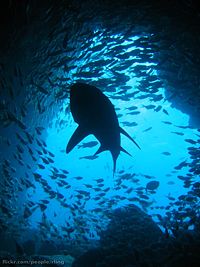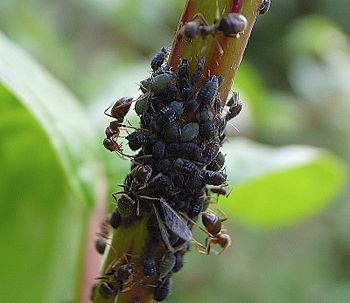Animal: Difference between revisions
imported>Joshua Choi No edit summary |
imported>Joshua Choi |
||
| Line 83: | Line 83: | ||
====Methods of obtaining food==== | ====Methods of obtaining food==== | ||
Animals | Animals obtain food in many ways, but most can be grouped into two types. The first, [[predation]] is a [[biological interaction]] where a heterotroph, called the predator, obtains food by consuming the cells of another organism, called the prey. [[Herbivore]]s are predators that primarily consume autotrophs, [[carnivore]]s are predators that primarily consume heterotrophs, and omnivores are predators that consume both autotrophs and heterotrophs. | ||
The other major method of obtaining food is [[detritivory]], where a heterotroph consumes food from [[detritus]]: dead [[organic matter]]. | The other major method of obtaining food is [[detritivory]], where a heterotroph consumes food from [[detritus]]: dead [[organic matter]]. Like the [[fungi]], detritivore animals recycle nutrients and are thus important in [[decomposition]]. | ||
====Methods of feeding==== | ====Methods of feeding==== | ||
Revision as of 22:14, 28 March 2009
| Animals | ||||||
|---|---|---|---|---|---|---|
 This grey nurse shark (Carcharias taurus) and the smaller fish surrounding it are animals.
| ||||||
| Scientific classification | ||||||
| ||||||
| Phyla | ||||||
|
Infrakingdom Eumetazoa
|
A major portion of life, the animals are those organisms classified into the kingdom Animalia. They are all multicellular eukaryotes, and also ingest their food and move by their own power at some point in their life cycle.[1]
Etymology
The word animal comes from the Latin animale, which is derived from anima, meaning "vital breath".
Characteristics
Cells and tissues
Animals are eukaryotic, meaning that they are comprised of cells which contain a nucleus. Unlike plants and fungi, their cells lack cell walls. Unlike bacteria, archaea and most protists, they are also usually multicellular.[1]
Animal cells are organized into specialized, integrated structures called tissues, which may in turn be organized into organs. Common to all animals is epithelium, a protective tissue covering their surfaces.[1] Many animals also share other structures such as guts (chambers with one or more openings for digestion), muscles (organs which contract for locomotion), and nerves (tissues which transmit signals between cells).
In addition, animals may be grouped by the number of tissue layers their embryos have. Sponges have but one, while diploblasts have two and triploblasts have three. In diploblasts and triploblasts, the inner layer is called the endoderm (which develops into the gut and associated tissue) and the outer layer is called the ectoderm (which develops into skin and the nervous system). Triploblasts also have a layer in between called the mesoderm, which develops into many internal organs such as the circulatory system, muscle, and bone.[1]
Food and energy

In one of the many ways animals obtain food, rancher ants drink sugary juice from aphids in return for the aphids' protection.
Animals are heterotrophs: they obtain nutrients by ingesting food from outside, generally digesting food in an internal chamber. This separates them from plants, algae, and other autotrophs, which do not ingest food. They are consumers that often occupy the higher levels of food chains in many ecosystems.[1] They obtain their food in a dazzling array of methods: for instance, rancher ants tend aphids and harvest the sugar that they secrete. [2]
Methods of obtaining food
Animals obtain food in many ways, but most can be grouped into two types. The first, predation is a biological interaction where a heterotroph, called the predator, obtains food by consuming the cells of another organism, called the prey. Herbivores are predators that primarily consume autotrophs, carnivores are predators that primarily consume heterotrophs, and omnivores are predators that consume both autotrophs and heterotrophs.
The other major method of obtaining food is detritivory, where a heterotroph consumes food from detritus: dead organic matter. Like the fungi, detritivore animals recycle nutrients and are thus important in decomposition.
Methods of feeding
The methods of feeding that animals use may be grouped into four general tactics. Suspension feeding, or filter feeding, filters out and concentrates food particles suspended in water or air, such as a baleen whale filtering out plankton. Deposit feeding swallows a substrate and ingests the microorganisms, detritus, and other cells within the substrate, such as an earthworm eats through soil. Fluid feeding sucks fluids such as body fluids from plants and animals, such as a butterfly drinking a flower's nectar. Mass feeding, or bulk feeding, eats chunks of flesh from prey into the mouth, such as a snail eating pieces of leaves. [1]
Body plan
Symmetry and cephalization
Animals, like other multicellular organisms, can be classified on their symmetry: are they symmetrical on zero, one, two, or more planes? The sponges are completely asymmetrical, but every other animal is symmetrical in at least one plane. Organisms symmetrical on more than two planes are radially symmetrical; they appear like the spokes of a bicycle wheel, and most alive today float in water or attach to substrates. Organisms with only one plane are bilaterally symmetrical; they have left and right sides and two ends, and they tend to possess longer and narrower bodies.[1]
Bilateral symmetry in animals also exhibit cephalization: the development a head on one end where feeding, sensory, and processing organs are concentrated. Bilateral symmetry and cephalization are both pervasive in animals, and it is thought that they enabled animals to more actively move and hunt.
Body cavities
Animals may possess fluid-filled cavities inside their bodies between the mesoderm and the endoderm, in which the gut and other organs may float. The degree to which mesoderm tissues—such as muscle and blood vessels—lines the surfaces of the cavity differs between animals. Some animals possess a cavity lined with mesoderm both inside the ectoderm and outside the gut; this kind of cavity is called a coelom, and animals with them are called coelomates. Other animals have a cavity lined with mesoderm only inside the ectoderm but not outside the gut; this kind of cavity is called a pseudocoelom, and animals with them are called pseudocoelomates. Animals that do not have any enclosed body cavity are called acoelomates.[1]
The coelom enables an animal's internal organs to move independently in it and oxygen and nutrients to circulate within it. Most of all, however, a coelom can act as a hydrostatic skeleton, enabling soft-bodied animals with no limbs to move through water.[1]
Movement
Animals are motile during at least one point of their life cycle. They move by a large variety of methods: swimming, crawling on a substrate, walking, or flying.[1]
Reproduction and life cycle
Origin and phylogeny
Animals are a monophyletic group, which means that all animals share one common ancestor. A group of protists called the choanoflagellates are the closest living relatives to animals.
- The sponges of today are the closest, most basal animal phylum to the choanoflagellates and the first group among the surviving animals to separate from the rest. Like all animals, they possess multicellularity and epithelia, but are otherwise very different from the other animals below.
- True tissues, diploblasty, and symmetry separate the other animals from the sponges. The Cnidaria (jellyfish and sea anemones) and Ctenophora (comb jellies) are radially symmetric and diploblastic.
- Eventually, some animal lineage developed bilateral symmetry, cephalization, and triploblasty. The group descended from that lineage is called Bilateria. The most ancient groups in Bilateria, the Acoelmorpha, lack coeloms, which suggest that animals in Bilateria developed from simple guts to complex coeloms.
- The other animals in Bilateria split into two fundamental, monophyletic groups: the protostomes and the deuterostomes, both of which are described below.